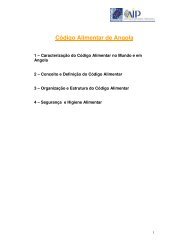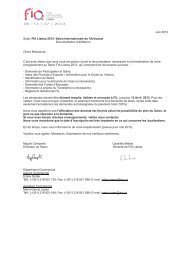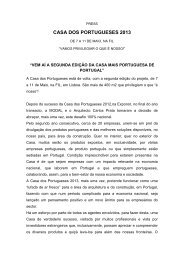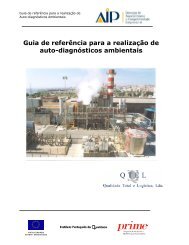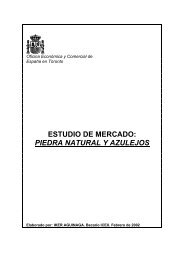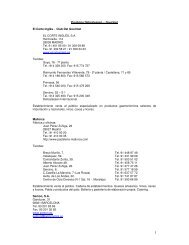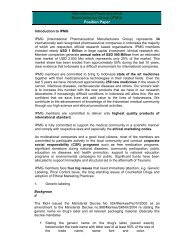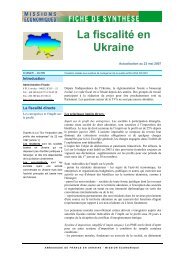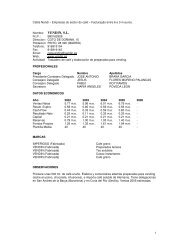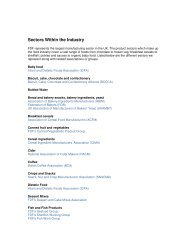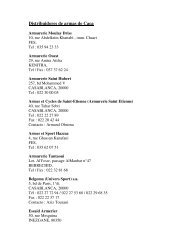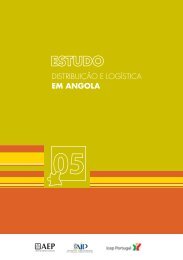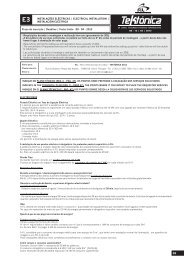Doing Business In (Insert Country Name Here)
Doing Business In (Insert Country Name Here)
Doing Business In (Insert Country Name Here)
You also want an ePaper? Increase the reach of your titles
YUMPU automatically turns print PDFs into web optimized ePapers that Google loves.
Past triple-digit inflation resulted in a high level of dollarization in the economy andbanking system, with 70 percent of banking assets held in dollars. Since the end of thecivil war, the Central Bank has devoted considerable effort to rebuilding trust in thekwanza, bringing inflation down to 17.7 percent in 2005 and 10 percent in 2006. Themandatory reserve requirement for non-government deposits, whether in kwanzas orforeign currency, is 15 percent. The reserve requirement for government deposits is 100percent, a measure that seriously limits the lending by state-owned banks.Private banks, particularly those from Portugal, have been rapidly entering a sector thatwas traditionally dominated by state banks. As of late 2006, Angola had 15 commercialbanks, three of them state-owned. Two of the Angola’s three major banks are privatelyowned. Under the 2000-2001 IMF Staff-Monitored Program, the government beganassessing its two remaining state-owned commercial banks for privatization, taking initialsteps to privatize the Bank of Commerce and <strong>In</strong>dustry (BCI) but not the Bank of Savingsand Credit (BPC). BPC has an extensive branch network throughout the country andmanages government payments. Two other Angolan Banks, the Banco de FomentoAngolano (BFA) and the Banco de Credito <strong>In</strong>ternacional (BIC), however, are alsoincreasing the number of their branches throughout the country.Banks have begun to offer a more diverse array of financial products and instruments.Auto loans and mortgages are increasingly available, as are 15-year mortgages at eightpercent interest. However unclear land titles and ill-defined property rights may, in someinstances, complicate and lengthen the process of applying for a mortgage. <strong>In</strong> otherfinancial services, three new insurance companies, Nossa Seguros, Global Seguros andMundial began operations in 2006.Banks have a low lending rate of 35% of deposits. It is difficult for borrowers to offercollateral due to a weak access to credit histories and unclear land titles. Banks prefer tomake their profits from transactions, short-term trade financing, and investments in highinterestgovernment bonds. <strong>In</strong> the past, state and state-affiliated companies enjoyedprivileged access to loans, often at concessionary rates, leading to several bank failures.Currently, the non-performing loan rate is relatively low, reflecting conservative lendingpractices throughout the sector. Legislative changes and development in the bankingsector are expected to produce widen availability of credit. The new land law shouldreduce confusion over property rights and help identify sources of collateral. The CentralBank is working to improve its credit database and is promoting a new financial sectorlaw and the nation’s first money laundering legislation.The Central Bank has developed a market for short-term bonds called Central BankTitles (Títulos do Banco Central) and long-term bonds called Treasury Obligations(Obrigacões do Tesouro). Most of these bonds are bought and held by local Angolanbanks. The Obrigacões have maturities ranging from 1 to 7.5 years, whereas the Títuloshave maturities of 91 to 182 days. For up-to-date information on current rates, seewww.bna.ao. The government issued more than $300 million worth of bonds in 2006. Anadditional 200 million worth of government bonds is traded privately by local Angolancompanies as well as major international banks.<strong>In</strong> December 2005, the government announced plans to develop a stock market andappointed a commission to oversee its creation. The government may privatize somestate-owned companies and list them on the stock exchange. The state oil company2/13/2007



